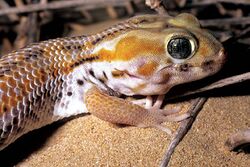Biology:Persian wonder gecko
From HandWiki
Short description: Species of lizard
| Persian wonder gecko | |
|---|---|

| |
| Scientific classification | |
| Domain: | Eukaryota |
| Kingdom: | Animalia |
| Phylum: | Chordata |
| Class: | Reptilia |
| Order: | Squamata |
| Family: | Sphaerodactylidae |
| Genus: | Teratoscincus |
| Species: | T. keyserlingii
|
| Binomial name | |
| Teratoscincus keyserlingii Strauch, 1863
| |
| Synonyms | |
| |
The wonder gecko (Teratoscincus keyserlingii), also known commonly as the giant frog-eyed gecko, is a species of lizard in the family Sphaerodactylidae. The species is endemic to parts of Asia.
Etymology
The specific name, keyserlingii, is in honor of Alexander von Keyserling, who was a Baltic German geologist and biologist.[1]
Geographic range
T. keyserlingii is found in Afghanistan, Iran, Pakistan , and the United Arab Emirates.[2]
Description
The holotype of T. keyserlingii has a total length of 15.8 cm (6.2 in), which includes a tail 5.6 cm (2.2 in) long.[3]
References
- ↑ Beolens, Bo; Watkins, Michael; Grayson, Michael (2011). The Eponym Dictionary of Reptiles. Baltimore: Johns Hopkins University Press. xiii + 296 pp. ISBN:978-1-4214-0135-5. (Teratoscincus keyserlingii, p. 140).
- ↑ Teratoscincus keyserlingii at the Reptarium.cz Reptile Database. Accessed 24 February 2019.
- ↑ Strauch (1863).
Further reading
- Macey, J. Robert; Fong, Jonathan J.; Keuhl, Jennifer V.; Shafiei, Soheila; Ananjeva, Natalia B.; Papenfuss, Theodore J.; Boore, Jeffrey L. (2005). "The complete mitochondrial genome of a gecko and the phylogenetic position of the Middle Eastern Teratoscincus keyserlingii ". Molecular Phylogenetics and Evolution 36: 188–193.
- Strauch A (1863). "Characteristik zweier neuen Eidechsen aus Persien ". Bulletin de l'Académie Impériale des Sciences de St-Pétersbourg 6: 477–480. (Teratoscincus keyserlingii, new species, p. 480). (in German and Latin).
Wikidata ☰ Q9357180 entry
 |


